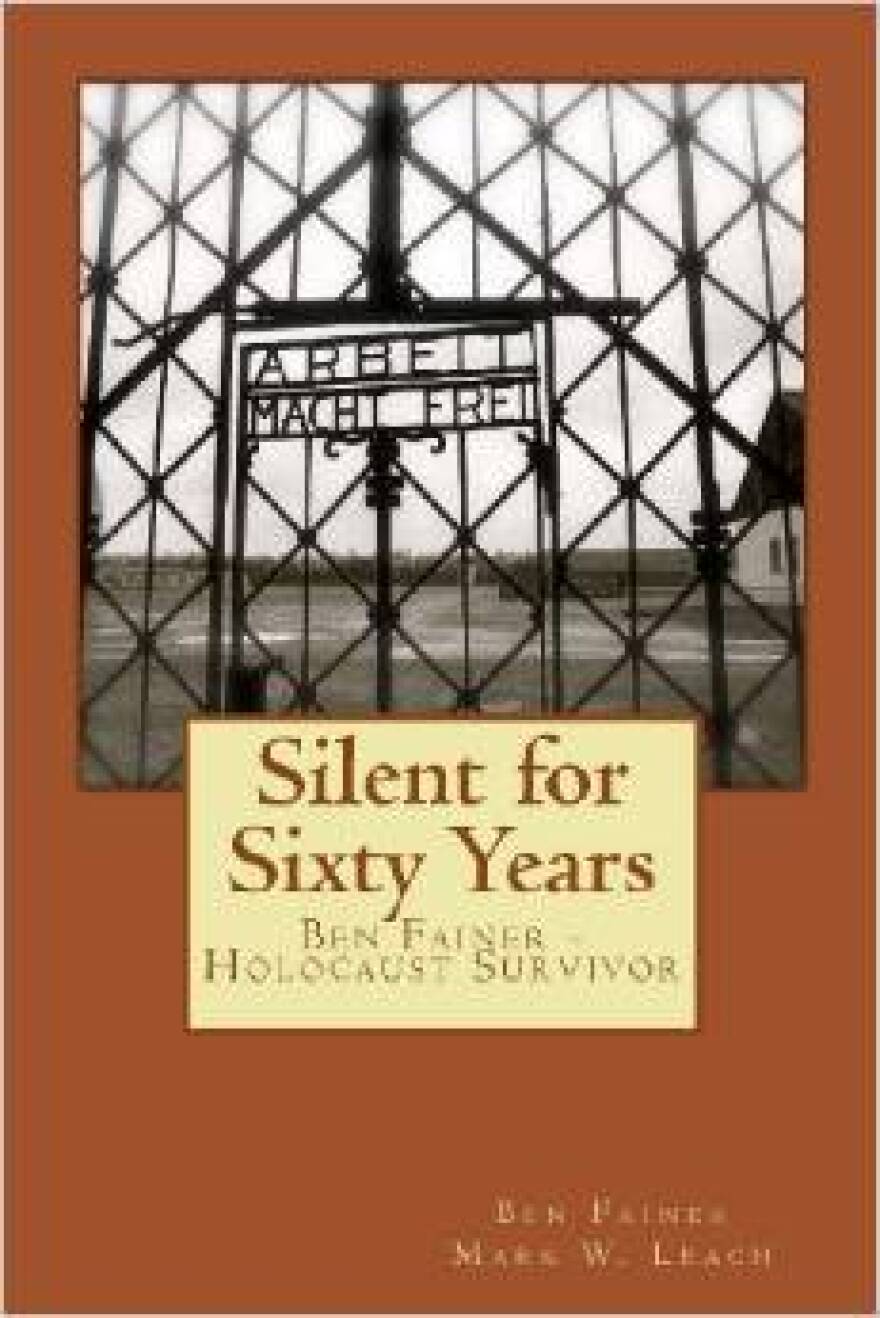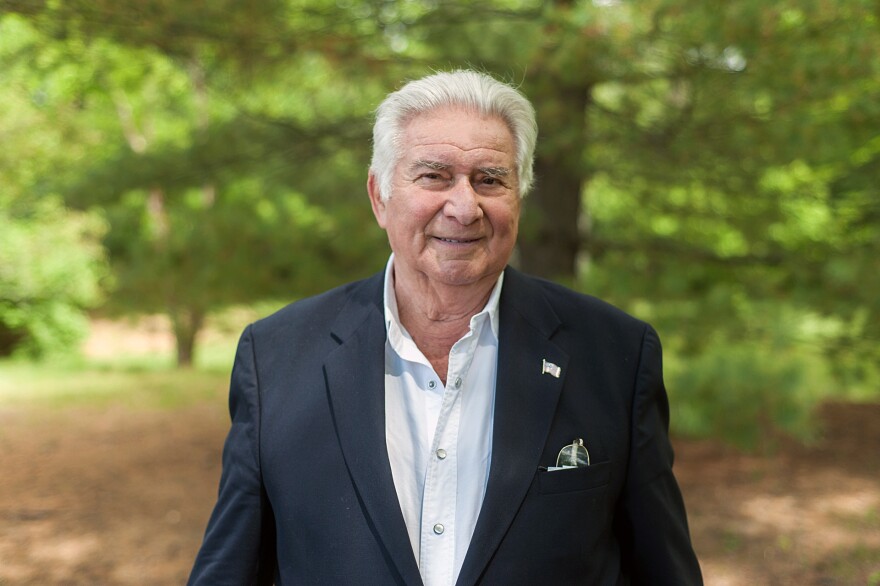Just because Ben Fainer was silent for 60 years doesn’t mean he has nothing to say.
Ripped from his home in Poland at age 9 by the Nazis, Fainer was separated from his family and sent from camp to camp to camp for six years until he was liberated by the American army in 1945, six years later. He made his way first to Ireland, where he stayed with relatives, then to Canada, and finally to St. Louis, where he spent decades in the garment industry.
For all that time, Fainer said he told his seven children nothing of the horrors he had experienced and seen. He wore long sleeves to cover up the tattoo on his arm – 178873 – and preferred not to speak at all about the experiences he has described this way:
“One minute you’re a kid doing your chores, looking forward to a little breakfast, and seeing your friends at school. The next, your family has been ripped apart, you’re standing in a strange building holding a thin wool blanket, and wondering what’s going to happen next.”
That passage comes from his book, “Silent for Sixty Years," which he wrote after he had been persuaded to leave his reticence behind and talk about his experiences, first in a video for the Shoah Foundation, then at the St. Louis Holocaust Museum & Learning Center.
After the war, Fainer said, he learned that of the 250 relatives who had been living in the region of Poland where he grew up, very few survived – and only he and his father from his immediate family. His mother and siblings, including an 8-day-old sister who had not even been named yet, were killed by the Nazis. He survived, he said, because he was large for his age and said he was 15 when he was only 9.
Fainer will discuss his book at a program at 7 p.m., Wednesday, July 23, at St. Louis County Library Headquarters, 1640 S. Lindbergh Blvd.
In a recent interview with St. Louis Public Radio, the 83-year-old Fainer talked about his life in the camps, his initial reluctance to discuss the ordeal and his final acceptance that his story is one that has to be told. But the experience remains painful, 75 years after it began.
In the book, he puts it this way:
“If telling my story wasn’t so important, I’d pray day and night for Almighty God to erase each and every memory.”
Here are other excerpts from what Fainer had to say:
On his reluctance to talk about his experiences:
“I’m not too much on getting a lot of fame, to tell you the truth. I wasn’t very outgoing. I worked all my life. I was very, very busy raising my family. ... I never wanted to do any kind of public thing, OK. I’ve been asked many times, and I never wanted to do it. It’s the same way I never raised my sleeve on my hand to show off my number ….
“It would only bring a lot of hardship to me, to bring back my mother. I just couldn’t do it. I just wanted to leave it alone. The only one was my wife. She used to bug me. She used to say "Benny, dear" -- I had the greatest wife in the world, but she used to bug the heck out of me. "Open up. Talk to your children. You’ll feel a lot better." I would say, "Susie, I’m not ready, OK."
How he wanted to protect his children:

“They asked me about it hundreds of times, but I never talked to my children. The only one who knew what I have done and what I have been and what I have seen and what I have suffered was my wife…. I did not want to talk to them about the horror, because it might have preyed on their mind, the horror and things that I have seen that are undescribable>. So I didn’t want them to know about it.”
On life in the camps:
“Our civilian clothes went, and we got our striped uniforms, and also my name was no longer Ben Fainer. I was 17-double 8 -73. We got the tattoos. Of course it was a concentration camp. The wires got higher. The lookout towers and so on and so forth. That was the start of the concentration camp….
“We stood at attention. They checked out everybody. We had wooden-soled shoes, but the tip of the toe was leather. This SS guy said to me, why did you not shine the shoes? So I told him, in German, I didn’t feel like it. So he belted me with a rifle. I bled for months. There was no doctor, so kept bleeding for weeks. I healed up, and ever since then I kept my mouth shut…. I figured if I got smart mouthed, I’m not going to last too long.”
How he lived daily with death:
“I’ve seen people die in front of me – killed, shot, sleeping with guys and talking and waking up two or three hours later and I say, are you awake, Charlie or Tom or whatever his name may be, and they’re dead as a doornail. Can you imagine that? I couldn’t take it. You sleep 4-5 guys in a bed sometimes, sometimes 2 or 3, sometimes go to bed with 2 or 3 or 4, and two of them would be dead. That’s hard to describe….
“The worst horror was Buchenwald. I don’t believe I can describe to you the horror that I have seen in Buchenwald. I’ve seen guys thrown into a crematorium who were alive, screaming, because they couldn’t talk, they couldn’t walk, they couldn’t stand. They were piled up. A lot of people have seen pictures from Buchenwald, the bodies were piled up, waiting to be cremated. I was in Block 15. The bodies piled up high. A lot of them dead, but a lot of them were wide awake, alive, but they couldn’t do anything about it. They were half-dead. That’s hard to tell. There’s few who would believe that.”
On his unexpected liberation by the Americans:
“I don’t know that I have it in my vocabulary, to tell you the truth. That morning was the greatest thing that every happened to me. That probably is the greatest thing that is existing. Can you imagine you see a tank, in the front, and the American soldiers are behind. In the pouring rain we stood for maybe two hours to see the guys come in different uniforms ….
“We didn’t know it was coming until they came down the hill. From what I heard, this was the last thing. They were going to do away with us. We were supposed to be on the death march. But evidently, whatever the death march was going to be, or whatever they were going to do with us thank God they didn’t, because the Americans came.”
On audience response to his story:
“I have never had a bad reaction from people as long as I’ve been speaking. They hug me. They embrace me. That’s all I can tell you.… I get the greatest reaction from mothers and fathers, who come with children the age of 12, 13, 14. I can’t describe the feeling when people wrap their arms around you and hug you and they thank me for what I’m doing….
“It does my heart good that they appreciate it. That’s very, very important. They tell me they’re thrilled to death that I’m doing it, because it needs to be told. I’m not an educator, and I’m not a story teller. I tell living horror that I experienced in six year, which is the worst horror that anybody can experience.”
How he managed to survive:
“The only reason I can tell you, the way I can describe it to you, is that there’s a certain thing that some human beings need to live – determination, when you say to yourself I have a life to live, and I have to survive. That’s how you survive. There’s no way. I’m going to be around for a long time. That’s how determined I was."

